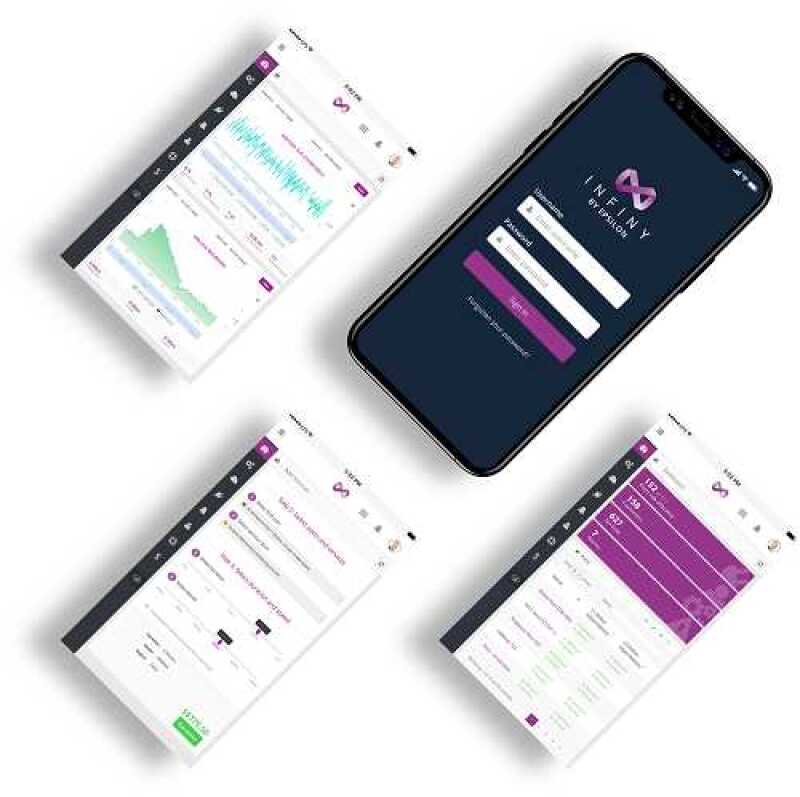Cisco CloudCenter Suite
This multicloud management solution allows enterprise IT teams to securely design, deploy, and optimise infrastructure and applications across multiple clouds from a single point of access. It delivers a consistent user experience, while controlling costs and aims to help the user meet compliance requirements.
CloudCenter Suite (pictured top) is one of the most mature products in Cisco’s cloud portfolio. It has evolved beyond minimum viable product status, to include a rich suite of features that address cost optimisation and a wide array of cloud workload management capabilities.
While in the beginning it was a one-size-fits-all proposition, now it’s available in three different editions that are designed to accommodate the needs of companies at different stages of the cloud adoption journey. It also comes as a software-as-a-service (SaaS) delivery model.
There are a lot of cloud workload management products out there that focus on the three major public clouds plus OpenStack and VMware.
Where Cisco believes CloudCenter Suite really stands out is in the breadth of disparate platforms that it can manage workloads across. It covers boutique clouds that most solutions would never even think about, but that Cisco customers have asked for. By supporting such a rich ecosystem of cloud providers, Cisco make the infrastructure as a service (IaaS) layer accessible to tech teams without forcing them to learn the IaaS platforms themselves.
The CloudCentre’s evolution will come as Kubernetes ushers containers into first class citizenry, as Cisco will provide more value to that pipeline.
Cisco states: “Specifically, we know that cost reporting is top of mind for our DevOps customers, and we’ve spoken to that directly with the introduction of the Cost Optimizer module in CloudCenter Suite 5.0, but moving forward we will be pouring even more effort into expanding the capabilities of that module. We know that DevOps are particular about their toolchain, so we want to be sure we meet their needs.”

CMI iSolutions
China Mobile International (CMI) launched its iSolutions cloud-network integration to give multinational enterprises a one-stop solution with self-service deployment. It has the ability to manage all of a customer’s cloud and network products on a single platform that makes cloud services more visible, accessible and manageable.
CMI has an extensive and reliable global network, with nine self-built submarine and eight terrestrial cable resources, five self-built data centres, 164 points of presence (PoPs) and 60 Cloud Connect PoPs, providing enterprise customers with a 99.99% guaranteed uptime service level agreement (SLA).
CMI’s iSolutions cloud-network integration solution allows customers to review cloud products, configure what they need, and deploy within seconds, saving time and resources. CMI is now seeking to bring more cloud service providers onto its iSolutions cloud-network integration platform in order to enrich the cloud-network ecosystem and address the specific needs of customers in different industries.

Epsilon Infiny
This portal-driven platform takes charge of local, regional and global connectivity by bringing networking into the cloud era.
It provides enterprises and service providers with a suite of connectivity and communications services. Users of Infiny can connect to over 100 data centres in Asia Pacific, Americas, Europe, Middle East and Africa with on-demand access to Internet Exchanges (IX) and direct connection to world-leading Cloud Service Providers (CSP).
Epsilon says that, “in the near future”, users of Infiny will continue to see more services and global destinations being added. It adds: “We will be enabling Infiny users to deliver 100G ethernet services on-demand globally as well as adding multi-cloud capabilities and SD-WAN orchestration capabilities on the platform.
“User experience on Infiny will also continue to evolve, allowing users to create multiple orders with shopping carts and getting instant assistance via live chats. We are making Infiny a one-stop shop for all enterprises and service providers’ connectivity needs.”
Using APIs, Epsilon has also successfully interconnected Infiny with its partner’s SDN platform, SD-Cloud Express by DCConnect, to provide on-demand connectivity into China. Users can instantly interconnect with an extended network of over 118 data and connect to local CSPs, Alibaba Cloud and Tencent Cloud.
Mark Smith, managing director at DCConnect, comments: “We are delighted to partner with Epsilon to provide our China customers access to fast, flexible and intelligent SDN services across the globe. They can instantly connect across both our SDN platforms seamlessly with a single user experience. The Infiny platform aligns with our vision of facilitating powerful networking solutions that are both scalable and agile. This partnership is driving the networking market forward and shows new possibilities for SDN.”
Product features:
• Launched in 2017 with over 500 users today
• On-demand, comprehensive set of ethernet and voice services
• Accessible via web-based portal and mobiles apps
• API-enabled for seamless integration • Network analytics and customisable dashboards
• Cross-carrier automation deployments delivering two-way inter-SDN platform orchestration
• White-label and partner model

PCCW Global Console Connect
Console Connect combines PCCW Global’s worldwide IP network with software automation to deliver on-demand, private, global connectivity. Console Connect customers can instantly provision direct connections to remote data centres, partners and cloud services.
The Console Connect Software-Defined Interconnect (SDI) platform is an industry response to the need from enterprises operating internationally for increasingly complex, sophisticated and secure connectivity.
Console Connect is essentially network automation software, allowing users with minimal technical ability to quickly spin-up virtual private Layer 2 and Layer 3 connections, bypass the unpredictable public internet and directly connect to their cloud applications, partners and business locations.
Console Connect enables secure, on-demand connectivity to hyperscale cloud providers including Amazon Web Services, Microsoft Azure, Google Cloud, IBM Cloud, Tencent Cloud, Alibaba Cloud, IBM Cloud and Qing Cloud.
The product will evolve with PAYG options and rates for connectivity that can be accessed through a simple-to-use pricing calculator, which lets the customer build a detailed quote for customised on-demand connectivity.
Although existing PCCW global customers currently need to order a separate Console Connect port to use the SDN service, they will soon be able to access it from their existing port.
Console Connect continues expand into more data centres, clouds, SaaS and integrate new regional carriers into its ecosystem.
Leo Liu, general manager for Alibaba Cloud Hong Kong, Macau and Korea, says: “Together with PCCW Global, we are making it easier for customers to accelerate their digital transformation process and with the Alibaba Cloud Express Connect, we can enable rapid provisioning of capacity to Alibaba Cloud as a result of our integration with Console Connect.”
Ronnie Klingner, president of mobility and digital solutions, PCCW Global, says: “The PCCW Global IP network is at the heart of Console Connect. We go to many parts of the world that others do not.”
Console Connect’s competitive advantages:
• Runs on the PCCW Global international MPLS network, which is physically separate to the general internet, which gives it a strong performance edge over its SDI competitors (which have to rent bandwidth from network operators), and offers enterprise- quality bandwidth and performance with security, guaranteed packet delivery, uptime and performance.
• Connects globally to 200 carriers in 76 data centres over 34 countries and connecting seven of the world’s leading public clouds. The use of APIs makes integrating the platform with clouds or other networks very straight-forward and secure, and appealing to the local, regional carriers for the ‘last mile’ connections off PCCW Global’s international network.
• Consumed as bandwidth-on-demand, based on the location of the A+B points being connected, the bandwidth consumed, and the duration of the connection: a day, a week, a month, or a year – up to three years in advance.

Aryaka Smart Connect
This SD-WAN service is designed to support customers making the move from legacy network architectures to cloud-ready ones.
The ‘plug-n-play’ cloud connectivity has pre-wired cloud connects into public cloud providers like AWS and Microsoft Azure, without the need to spin up operationally complex virtual machines and manage them.
This service allows for the gradual implementation of a software-defined solution, ensuring that existing on-premises and web applications continue to function.
It supports Amazon Web Services, Google Cloud, Oracle, and Office 365 and delivers multi-cloud access in just 30 milliseconds, from data centre to both IaaS and/or SaaS.
Business can make the move from legacy MPLS to a software-defined solution and have the new Aryaka network deployed in a matter of days. It allows them to be responsive to the needs of their business and align their WAN transformation efforts with the company’s digital transformation goals. It also makes their business ready for the multi-cloud era, globally.
Aryaka’s Cloud connect can bring about a seamless managed experience between wide-area connectivity and public clouds or SaaS providers without any incremental infrastructure.
With over 30 points of presence globally, the Aryaka solution deploys in a matter of hours to any number of global locations. Aryaka Smart Connect addresses all challenges experienced by businesses needing to make the step to a fully software-defined network and has one or more pre-existing Cloud environments to integrate into it.
Aryaka owns its own network of global PoPs, as well as WAN optimisation and security software including partnerships with the likes of Zscaler and Palo Alto networks, giving enterprises complete and secure control over internet traffic, and even allowing them to categorise and prioritise different types of traffic.

Joshua Bancroft, IHS Markit's senior research analyst of cloud and data centre research practice, says: “As enterprises continue to undergo digital transformation, they are having to re-think their WAN strategies to include computing at the edge, which creates additional WAN management complexity. “Enterprises are looking to reduce this complexity by having service providers implement and manage their WAN as they adopt SD-WAN.
“According to a recent IHS Markit survey, SD-WAN as a managed service, bundled with other NFV services and connectivity, will be the preferred consumption method by the end of 2019. Service providers that focus on providing SD-WAN as a managed service, with global connectivity, address an important market requirement.”
View this article as a digital page in the June/July edition of Capacity magazine and see what other great articles you may have missed out on!





